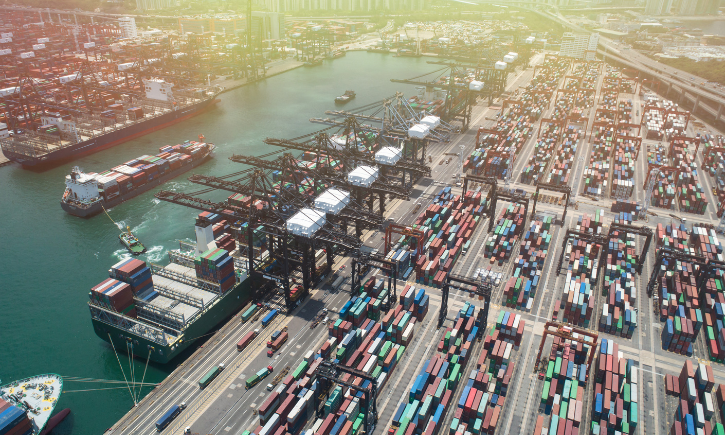What is the Supply Chain Act?
The Supply Chain Act is a significant step towards global sustainability and responsibility in business. It aims to oblige companies to monitor and ensure the entire supply chain of their products and services. Human rights, environmental protection and social standards are to be upheld in these processes.
Explanation of the Supply Chain Act and its objectives
The Supply Chain Act (LkSG), also known as the Due Diligence Act, is a legal framework that obliges companies to analyse, monitor and minimise the impact of their supply chains on people, the environment and society. This law aims to hold companies accountable for the consequences of their global business activities and ensure that they implement sustainable practices.
All advantages at a glance
How we can support you
Given the far-reaching consequences of irresponsible supply chains, the role of sustainability consulting is vital. Our company can help you comply with the law by:
- Carrying out risk analysis: Our sustainability consultants can help you identify potential risks in your supply chain and develop strategies to minimise them.
- Ensuring compliance: We can help you develop policies and procedures to meet the requirements of the Supply Chain Act and ensure your entire supply chain meets legal standards.
- Set sustainability goals: Our consultants can help you set long-term sustainability goals and integrate them into your business strategy to achieve positive environmental and social impact.
- Create transparency: Sustainability reporting and transparent communication are essential aspects of supply chain responsibility. We support you in implementing transparent reporting mechanisms.
Who is it for?
- Managing Director,
- Environmental Officer,
- sustainability managers,
- project engineers,
- product managers,
- development managers
Unique advantages with PPP:
- Fast processing: Thanks to state-of-the-art software systems, we deliver results in record time.
- International team: Our global team is at your side for all issues relating to supply chain law.
Free initial consultation
Would you like to find out more about supply chain law? Don’t hesitate to contact us and arrange a free initial consultation. Our experts are at your disposal to discuss your specific requirements and offer you customised solutions.
Patrick Wortner
CEO | MBA and Eng., Dipl.-Ing. (FH)
The main objectives of the Supply Chain Act include:
- Protect human rights: Companies should ensure that no human rights violations take place in their supply chain. This includes the elimination of forced labour, child labour, discrimination and the promotion of fair working conditions.
- Promote environmental protection: The law emphasises the environmental impact of supply chains. Companies should integrate sustainable resource management and environmental protection practices into their business activities.
- Strengthen social responsibility: Companies must promote social standards and ethical business practices throughout their supply chain. This includes the protection of local communities and fair trade.
Global trends and developments in the area of supply chain responsibility

The introduction of the Supply Chain Act reflects a global trend in which companies are increasingly being called upon to assume social and environmental responsibility. In recent years, there has been an increased awareness of the importance of sustainable supply chains, driven by various factors:
- Consumer pressure: customers increasingly expect transparency and ethical practices from the companies they buy from. This has pushed companies to implement sustainable supply chains.
- Legal developments: In addition to Europe, other countries have introduced or considered similar laws and regulations to strengthen supply chain responsibility.
- International standards: Organisations such as the United Nations and the International Labour Organisation (ILO) have developed guidelines and standards that emphasise the responsibility of companies in relation to their supply chains.
Why is the Supply Chain Act important?
The Supply Chain Act is of great importance as it highlights the serious consequences of irresponsible supply chain practices, both for businesses, consumers and society as a whole. Irresponsible supply chains can have far-reaching consequences:
- Legal consequences: Legal sanctions, fines and lawsuits can be imposed on companies for non-compliance with supply chain law. This can have a significant financial impact.
- Human rights violations: For society, irresponsible behaviour in supply chains means that human rights are disregarded and working conditions are worsened. This has far-reaching social consequences, particularly in developing countries.
- Supply chain risks: Irresponsible supply chain practices entail financial risks, as disruptions in the supply chain, for example due to labour disputes or environmental damage, can have a negative impact on production and sales.
- Reputational damage: Companies involved in scandals regarding human rights violations, environmental impacts or labour law infringements often suffer considerable reputational damage. This can have a significant impact on customer trust and brand loyalty.
Compliance management and ISO 37301: A key to compliance with the Supply Chain Act
Compliance with supply chain law requires effective compliance management to ensure that companies fulfil all requirements and ensure ethical practices throughout their supply chain. One important standard that can help companies do this is ISO 37301.
ISO 37301 is an internationally recognised standard for compliance management systems (CMS). It provides a framework to help organisations identify, assess and manage compliance risks to ensure adherence to legal and ethical requirements. This standard is of great importance in the business world as it defines the structure and methods for implementing compliance requirements.
The importance of ISO 37301 for compliance management in the context of supply chain law lies in the creation of a clear and systematic approach to the fulfilment of legal requirements. By implementing an ISO 37301-compliant CMS, companies can:
- Minimise compliance risks: The standard assists in identifying potential risks in relation to the Supply Chain Act and enables proactive measures to be taken to minimise these risks.
- Efficient use of resources: ISO 37301 promotes the efficient use of resources as companies are able to develop compliance programmes based on clear guidelines and procedures.
- Creating transparency and trust: Compliance with the standard helps to create transparency, which in turn builds trust among stakeholders, including customers and investors.
Outlook
The future of supply chain law promises fundamental changes in the way companies operate globally. Supply chain law is expected to continue to grow in importance and expand globally.
With stricter requirements and technological support, companies are increasingly being asked to make their supply chains more ethical and sustainable.
This not only promotes responsible business practices, but also strengthens the long-term competitiveness of companies.
Free initial consultation
Would you like to find out more about supply chain law? Don’t hesitate to contact us and arrange a free initial consultation. Our experts are at your disposal to discuss your specific requirements and offer you customised solutions.
Patrick Wortner
CEO | MBA and Eng., Dipl.-Ing. (FH)
Frequently asked questions
What is the Supply Chain Act and what impact does it have on my company?
The Supply Chain Act is a legal framework that requires companies to comply with human rights and environmental standards in their global supply chain. It can have a significant impact on your business, particularly in terms of liability and the need to promote sustainable practices.
Does the law apply to all companies or only to certain sectors and sizes?
The law generally applies to larger companies, especially those with complex international supply chains. However, there are variations depending on the country and region, so close scrutiny is required.
What are the specific requirements and obligations that my company must fulfil?
The specific requirements and obligations vary by country and region, but may include the disclosure of supply chain information, risk assessments and the implementation of compliance measures.
How can I ensure that my supply chain complies with legal standards in terms of human rights and environmental justice?
Ensuring compliance with human rights and environmental standards requires reviewing and improving your supply chain, working with suppliers and implementing control mechanisms.
What measures need to be taken to identify and minimise risks in my supply chain?
To minimise risks in your supply chain, you should carry out risk analyses, consider identifying sources of danger, partnering with trustworthy suppliers and setting up control systems. The exact measures depend on your industry and your specific risks.


